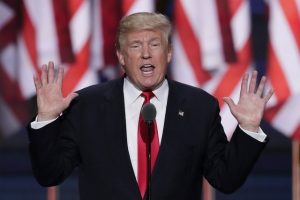The FBI is being investigated by the Justice Department’s internal watchdog to check for bias, if any, against Hillary Clinton. Congressmen allied with the president-elect are threatening to investigate the head of an independent government watchdog, to check for bias, if any, against Mr Trump. The legislature has already resuscitated an obscure 1876 rule that would allow punitive selective sanctions against one or many federal government employees, prompting fears of mass firings for political reasons. And the incoming president has declared himself unimpressed by America’s intelligence agencies and promised sweeping change in a way that sounds like a threat.
Every part of the US government appears to be fighting or preparing to fight the other. Partisan politicking is driving the affairs of the American state as never before. For all that it is the world’s richest, most militarily powerful country, the United States is arguably the weakest it has ever been in heart, spirit and soul. Is this political auto-cannibalism? Is America literally consuming itself? Is a great power that has faced down many external challenges in the past 240 years on course to be defeated by itself?
Those who scoff at the question as gross exaggeration will argue that every country is entitled to the short-term chaos that marks big political changeovers.
Yes, but it is not business as usual for an incoming American president’s chief of staff to threaten the director of the office of government ethics for daring to say that Mr Trump’s approach to his conflict of interests “doesn’t meet the standards … that every president in the last four decades has met”. Former ethics lawyers Richard Painter and Norman Eisen, who respectively worked in a Republican and Democratic White House, recently described incoming chief of staff Reince Priebus’s behaviour – on national television – as follows: “In a scene like something out of a gangster B-movie, Priebus warned the director that ‘he ought to be careful’ … Priebus’s glare of menace was unmistakable. The only thing he left out was cracking his knuckles.”
It is also not a normal feature of a presidential transition for the incoming commander-in-chief to belittle his intelligence agencies. By putting the word “intelligence” in quotation marks in tweets, comparing operatives to Nazis, accusing them of politically motivated leaks against him and publicly commending WikiLeaks founder Julian Assange and Russian president Vladimir Putin as more believable, America’s new president risks provoking deep and corrosive internal conflicts.
It’s worth remembering that the US has remained stable and prospered mainly because it has treated bipartisan political norms as sacrosanct and also paid equal heed to informal standards that are upheld without enforcement by law. As Dartmouth College political scientist Brendan Nyhan warned after Mr Trump’s election victory, “no one is saying that the US government is disappearing overnight … but growing tolerance for conflicts of interest in government, limitations on media access and accountability, and harsh treatment of minority groups can accumulate”.
In other words, perhaps the only power that can defeat mighty America is itself.
Osama bin Laden, Al Qaeda’s former leader, understood this well as his strategy revealed. Some 20 years ago, he told his young son Omar that to “obliterate America” it had to be destroyed “from within”. He meant that its economy had to be destroyed, it must be forced to engage in conflicts in different theatres haemorrhaging much blood and treasure, and that it had to be consigned to the new dark ages of doubt, fear and rage, uncertain of who to believe, what to trust, where to seek relief and how. At almost the same time as bin Laden was formulating his deadly manifesto, political scientist Samuel Huntington was warning of the danger that America posed to itself. In his 1997 essay The Erosion of American National Interests, Huntington predicted division and confusion, with his country becoming “less of an actor and more of an arena [for foreign powers]”.
But even he did not see this as the result of warring US government agencies and a president who responds to all criticism by undermining cherished institutions and pointed threats of vengeance.
The Roman empire fell despite its overwhelmingly strong military because of internal divisions. As for the Achaemenid empire founded by Cyrus the Great, it was defeated by unwise leaders. In his exploration of why empires fall, the Greek historian Herodotus noted that “human beings and prosperity never endure side by side for long”, ascribing this to hybris, a Greek word meaning outrageous arrogance, which is usually written today as hubris.
Herodotus lived in the age of the Achaemenids. That empire was the economic superpower of its day and had a superb military and infrastructure. At its height, it stretched from modern-day Pakistan, across the Middle East and right up to the Danube.
But its King Darius suffered from hubris, a condition that the ancient Greeks believed was preceded by a moral blindness that perilously ignores the idea of divine or human consequences.
Of course, the US does not need to delve into esoteric historical tracts to diagnose its current affliction. Pogo, a much-loved American comic strip that ran for 60 years from 1913, put it as follows during its domestic anti-communist conniptions of demagoguery and repression known as McCarthyism: “We have met the enemy and he is us.”


